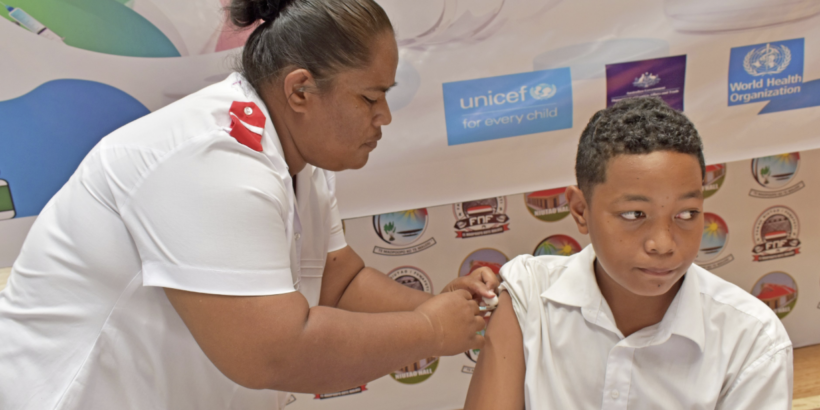Earlier this year, Tuvalu launched a typhoid conjugate vaccine (TCV) campaign in schools and local communities, aiming to protect the entire population from typhoid. The country has recently seen an increase in patients with symptoms resembling typhoid. Without reliable laboratory diagnostic capacity, definitive diagnosis has been challenging. This campaign, initiated by the Tuvalu Ministry of Health, seeks to eliminate typhoid in this small island nation on the frontlines of climate change.
A country vulnerable to climate change
Tuvalu is in the South Pacific Ocean and consists of nine small islands. The population of more than 11,000 people all live at an elevation of less than five meters above sea level. As a low-lying nation, Tuvalu is exceptionally vulnerable to the impacts of extreme weather events caused by climate change. There has been an increase in the frequency and severity of extreme weather events such as floods, cyclones, and heavy rainfall. These events can overwhelm water and sanitation infrastructure, resulting in water contamination and disrupted sanitation services. This can increase the risk of typhoid as water sources become contaminated.
A strategic solution
Recognizing the potential for increased typhoid cases, alongside the growing impact of climate change, we made a strategic decision to introduce TCV. Tuvalu received ten thousand TCV doses from the Australian Department of Foreign Affairs and Trade (DFAT) and UNICEF. TCV will provide protection to Tuvaluans living in communities prone to extreme weather events, which is much of our population. The campaign began in February 2024, focused on schools and communities in Funafuti, the capital. Subsequent phases will extend to the outer islands to ensure everyone between ages 9 months and 65 years is vaccinated.
This partnership, involving the Ministry of Health, UNICEF, Tuvalu Red Cross, and the Australian Government, was a strategic and proactive response to eliminate typhoid. Furthermore, UNICEF has expressed its commitment to continue working with relevant stakeholders, including DFAT, the Ministry of Health in Tuvalu, and the World Health Organization, to ensure TCV coverage throughout the entire country.
With the TCV introduction, we had an opportunity to invest in and strengthen Tuvalu’s routine immunization system. The Ministry of Health and UNICEF expanded vaccine cold chain storage and increased the vaccine delivery capacity of health workers. These efforts were complemented by a robust community engagement plan to increase the demand for the vaccine.
Potential for typhoid elimination
As an island nation with no international land borders, Tuvalu could eliminate typhoid from the country. If every person is vaccinated and typhoid transmission can reach zero, it is possible that no new cases will be diagnosed in coming years. This is a long-term vision, which will only be possible once every eligible person receives a TCV. With improved water, sanitation, and hygiene interventions, alongside TCV, we are hopeful that typhoid can be eliminated from our country.
Photo: A child receives TCV during Tuvalu’s introduction campaign. Credit: Tuvalu Department of Health.



